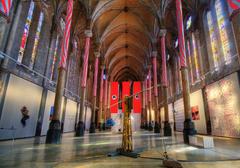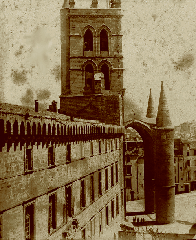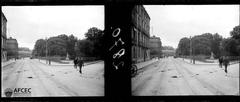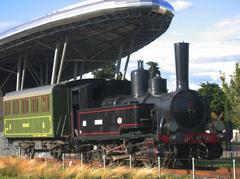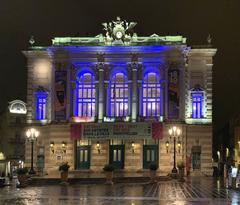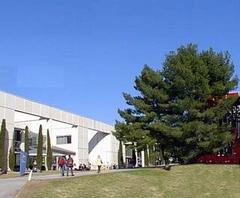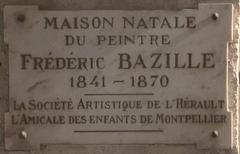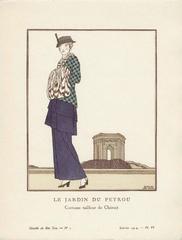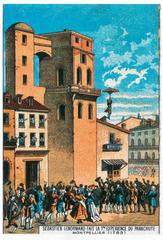Departmental Archives of Hérault Montpellier: Visiting Hours, Tickets, and Complete Guide
Date: 14/06/2025
Introduction
The Departmental Archives of Hérault, located in the contemporary Pierresvives building designed by Zaha Hadid, are a cornerstone of historical preservation in Montpellier. Since their founding during the French Revolution in 1790, the archives have preserved centuries of documentation reflecting the region’s administrative, cultural, and social evolution. As part of a UNESCO Memory of the World candidacy, these archives rank among France’s most significant historical collections, offering essential resources for historians, genealogists, students, and travelers eager to explore the heritage of Hérault and the broader Occitanie region (journals.openedition.org; montpellier.fr; pierresvives.herault.fr; FamilySearch).
This comprehensive guide provides all the information you need to plan your visit, from opening hours and accessibility to highlights of the collections and practical visitor tips.
Table of Contents
- Origins and Development of the Departmental Archives
- Collection Highlights
- Planning Your Visit
- Visitor Facilities and Services
- Getting There: Location and Transportation
- Events, Exhibitions, and Educational Activities
- Architectural Features of Pierresvives
- Frequently Asked Questions (FAQ)
- Visitor Tips and Nearby Attractions
- Conclusion and Further Resources
Origins and Development
The Departmental Archives of Hérault were established in 1790 to safeguard public records and ensure continuity of legal and governmental documentation following the administrative reforms of the French Revolution. Over time, the collections have expanded to include not only official documents but also private archives, maps, architectural plans, and materials reflecting the region’s distinct identity and achievements, notably in the fields of medicine and urban development (journals.openedition.org).
Collection Highlights
Administrative and Legal Records
The core of the archives consists of:
- Civil and parish registers (from the late 18th century onward)
- Notarial deeds and judicial proceedings
- Cadastral maps and urban planning documents
These records are invaluable for genealogists, historians, and legal researchers tracing family histories, property transactions, and the evolution of local governance (FamilySearch).
Medical Heritage and UNESCO Candidacy
Montpellier’s world-renowned medical faculty, with an 800-year tradition, is well represented within the archives. Manuscripts, teaching materials, and correspondence related to medical education contribute to a joint UNESCO Memory of the World candidacy, placing these archives alongside other prestigious French collections (montpellier.fr).
Urban Planning and Architectural Holdings
The archives preserve substantial documentation from the Mission Racine (1960–1980), which transformed the Languedoc-Roussillon coastline into a major destination. These include original reports, plans, and correspondence with architects such as Jean Balladur, offering insight into regional development (journals.openedition.org).
Private and Family Archives
Personal letters, diaries, photographic collections, and business records round out the holdings, providing a human dimension to Hérault’s history and chronicling everyday life across centuries.
Planning Your Visit
Opening Hours
- Pierresvives Reading Rooms:
- Monday–Friday: 8:30 am–12:30 pm & 1:30 pm–5:30 pm
- Closed weekends and public holidays
- Hours may vary for special events or exhibitions—check the official website for updates (Annuaire Mairie).
Entry and Tickets
- Admission: FREE for all visitors.
- Registration: Required for access to reading rooms and to consult original documents; bring a valid photo ID to obtain a reader’s card.
- Special Services: Fees may apply for certified copies or high-resolution reproductions.
Accessibility
- The Pierresvives building is fully accessible to visitors with disabilities, with ramps, elevators, and adapted restrooms throughout. Assistance dogs are welcome (Archello).
Guided Tours and Workshops
- Regularly scheduled guided tours and educational workshops offer insights into the collections and the architecture of Pierresvives. Group reservations and school visits are available; refer to the events calendar for details.
Photography Policy
- Photography for personal use is generally permitted in public areas and exhibitions, but photographing archival materials may require prior authorization. Always check with staff on-site.
Visitor Facilities and Services
- Reception and Information: Multilingual assistance (primarily French/English) and orientation on arrival.
- Reading Rooms: Spacious, with individual desks, Wi-Fi, power outlets, and document handling supports.
- Digital Resources: Computer terminals provide access to digitized archives; remote access is available with a personal account (Auprès de nos Racines).
- Lockers and Cloakroom: Free lockers for personal belongings.
- Café and Bookshop: On-site café for refreshments and a shop with local history publications.
- Restrooms: Accessible facilities on all floors.
Getting There: Location and Transportation
- Address: 907 rue du Professeur Blayac, 34080 Montpellier, France
- By Tram: Line 1 – “Halles de la Paillade” stop (short walk to Pierresvives)
- By Bus: Several local routes serve the area
- By Car: On-site parking available; spaces may be limited during peak times
- By Bicycle: Bike racks provided at the entrance (Annuaire Mairie)
Events, Exhibitions, and Educational Activities
The archives and the Pierresvives complex regularly host temporary exhibitions, cultural events, lectures, and workshops on genealogy, paleography, and regional history. Many of these events are free and open to the public; check the official calendar for current programming.
Architectural Features of Pierresvives
Pierresvives is a modern landmark, measuring 200 meters long and 25 meters high, clad in precast concrete and glass. Designed by Zaha Hadid, the structure is celebrated for its dynamic form and integration of archives, sports, and youth services, making it a destination for architecture enthusiasts as well as historians (Archello).
Frequently Asked Questions (FAQ)
Q: What are the opening hours?
A: Monday–Friday, 8:30 am–12:30 pm and 1:30 pm–5:30 pm; closed weekends and public holidays.
Q: Is admission free?
A: Yes, general admission and use of reading rooms are free.
Q: Do I need to register to access documents?
A: Yes, bring valid photo ID to obtain a reader’s card.
Q: Are guided tours available?
A: Guided tours and educational programs are offered; check the website for schedules.
Q: Is the site accessible for people with disabilities?
A: Fully accessible, with appropriate facilities and staff support.
Q: Are digital resources available?
A: Many collections are digitized and accessible online and on-site.
Visitor Tips and Nearby Attractions
- Plan Ahead: Use the online catalog to identify documents and reserve rare items in advance.
- Language: Most materials are in French; basic proficiency or translation tools are helpful.
- Travel: Public transport is recommended due to limited parking.
- Nearby Sites: Combine your visit with the Musée Fabre, Promenade du Peyrou, or Montpellier’s historic city center (Velvet Escape; Rue des Vignerons).
Conclusion
The Departmental Archives of Hérault at Pierresvives are more than a research institution—they are a vibrant cultural hub and architectural landmark, open to all. With free entry, extensive digitization, and expert staff, they offer an invaluable resource for understanding the past and engaging with the present. Whether your interest is historical research, genealogy, architecture, or cultural exploration, a visit to the archives is a highlight of any Montpellier itinerary.
Plan your visit today, explore the collections, and discover the legacy of Hérault!
References and Further Reading
- journals.openedition.org
- montpellier.fr
- pierresvives.herault.fr
- FamilySearch
- Annuaire Mairie
- Auprès de nos Racines
- Archello
- Velvet Escape
- Rue des Vignerons
